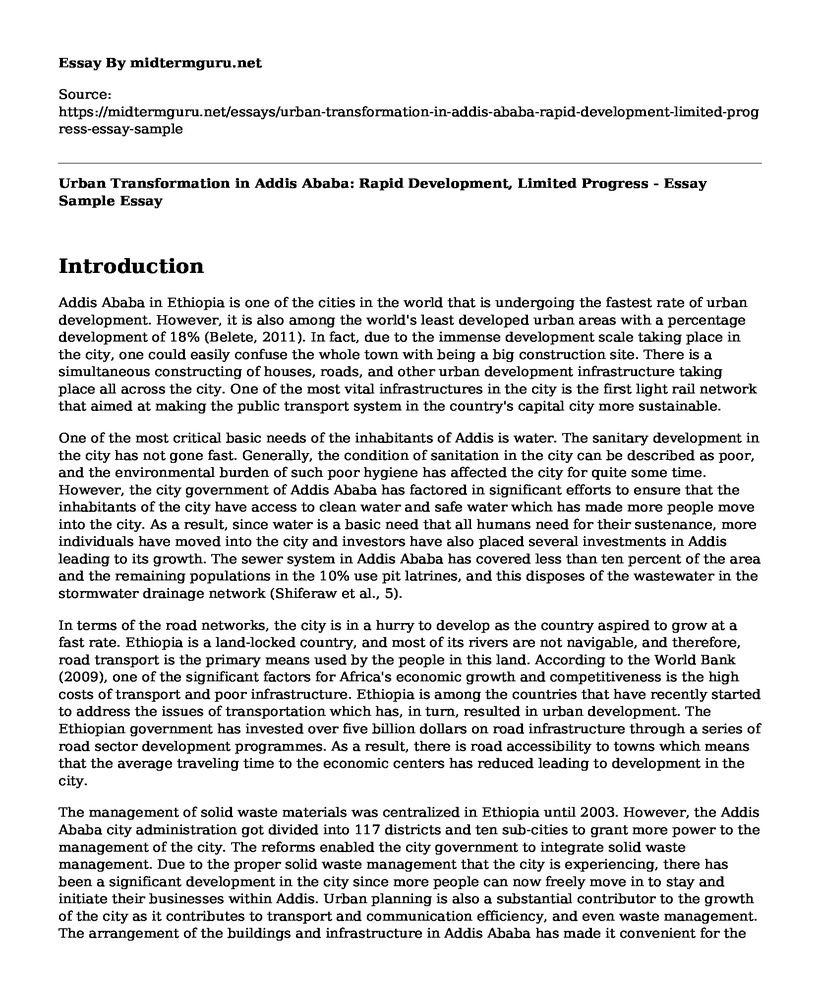Introduction
Addis Ababa in Ethiopia is one of the cities in the world that is undergoing the fastest rate of urban development. However, it is also among the world's least developed urban areas with a percentage development of 18% (Belete, 2011). In fact, due to the immense development scale taking place in the city, one could easily confuse the whole town with being a big construction site. There is a simultaneous constructing of houses, roads, and other urban development infrastructure taking place all across the city. One of the most vital infrastructures in the city is the first light rail network that aimed at making the public transport system in the country's capital city more sustainable.
One of the most critical basic needs of the inhabitants of Addis is water. The sanitary development in the city has not gone fast. Generally, the condition of sanitation in the city can be described as poor, and the environmental burden of such poor hygiene has affected the city for quite some time. However, the city government of Addis Ababa has factored in significant efforts to ensure that the inhabitants of the city have access to clean water and safe water which has made more people move into the city. As a result, since water is a basic need that all humans need for their sustenance, more individuals have moved into the city and investors have also placed several investments in Addis leading to its growth. The sewer system in Addis Ababa has covered less than ten percent of the area and the remaining populations in the 10% use pit latrines, and this disposes of the wastewater in the stormwater drainage network (Shiferaw et al., 5).
In terms of the road networks, the city is in a hurry to develop as the country aspired to grow at a fast rate. Ethiopia is a land-locked country, and most of its rivers are not navigable, and therefore, road transport is the primary means used by the people in this land. According to the World Bank (2009), one of the significant factors for Africa's economic growth and competitiveness is the high costs of transport and poor infrastructure. Ethiopia is among the countries that have recently started to address the issues of transportation which has, in turn, resulted in urban development. The Ethiopian government has invested over five billion dollars on road infrastructure through a series of road sector development programmes. As a result, there is road accessibility to towns which means that the average traveling time to the economic centers has reduced leading to development in the city.
The management of solid waste materials was centralized in Ethiopia until 2003. However, the Addis Ababa city administration got divided into 117 districts and ten sub-cities to grant more power to the management of the city. The reforms enabled the city government to integrate solid waste management. Due to the proper solid waste management that the city is experiencing, there has been a significant development in the city since more people can now freely move in to stay and initiate their businesses within Addis. Urban planning is also a substantial contributor to the growth of the city as it contributes to transport and communication efficiency, and even waste management. The arrangement of the buildings and infrastructure in Addis Ababa has made it convenient for the city council to manage the solid wastes.
Works Cited
Belete, Dagnachew Adugna. "Road and urban storm water drainage network integration in Addis Ababa: Addis Ketema Sub-city." Journal of Engineering and Technology Research 3.7 (2011): 217-225. http://www.academicjournals.org/app/webroot/article/article1380190860_Belete.pdf
Shiferaw, Admasu, et al. "Road infrastructure and enterprise development in Ethiopia." The International Growth Centre (2012). http://roadsforwater.org/wp-content/uploads/2013/10/Road-Infrastructure-and-enterprise-development-in-Ethiopia.pdf
Cite this page
Urban Transformation in Addis Ababa: Rapid Development, Limited Progress - Essay Sample. (2023, Jan 11). Retrieved from https://midtermguru.com/essays/urban-transformation-in-addis-ababa-rapid-development-limited-progress-essay-sample
If you are the original author of this essay and no longer wish to have it published on the midtermguru.com website, please click below to request its removal:
- Essay on Organizational Vision Change
- Country Factors of Production - Economics Paper Sample
- Essay on Aviation Maintenance Issues
- Annotated Bibliography on Road Safety Measures - Paper Example
- The Quality and Safety Education for Nurses (QSEN) - Paper Example
- Empowering Employees: Strategies for Leader Success - Essay Sample
- The Developmental Levels of Leadership - Essay Sample







